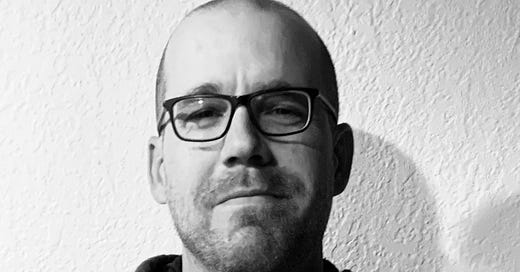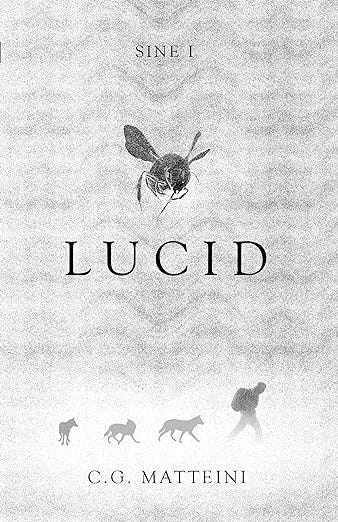Welcome to Indie Author Spotlight where I interview talented writers I’ve met online who have valuable insights to share on their writing process, publication, and what it means to be an indie author.
C. G. Matteini is the author of the newly released science fiction novel Lucid, the first in the “Sine" series. His poetry collection titled Us was published in 2023. He won the Literary Titan gold award for a collection of poems and short stories called The Peace Quaternary. He lives in Colorado Springs with his wife and two sons.
How did you initially get into fiction writing?
Thanks for asking! Thanks for interviewing me, J.B.
I went through a period of intense psychological and spiritual development between the ages of 19 and 25 (not unlike many others, I'm sure). This went on during college, travelling abroad during college, and living in San Francisco post-college with my girlfriend, now wife. It was very beautiful at times and very difficult at times. Through it all, I developed a worldview. At 25, I started summarizing that worldview and what I had learned about myself in a journal. One day, I don't remember when, I was standing on the roof of my apartment building in San Fran, looking out at the bay, the ocean, the Golden Gate, and my eyes were drawn to the door on the roof of the apartment building behind mine. It just happened: I sensed a story there. I think I saw an escape. I sensed a story on Angel Island too, a specific scene. I started writing. The journal became the main character's journal.
Can you describe what your new book is about?
Thematically, it's about the connection between all things, the beauty of that connection and the pain that comes (to others and to oneself) with damaging it or severing it. It's about consciousness and time and how they are fluid. It's about love lost. It's about a guy trying to figure out his life, trying to decide whether to follow his passions or sell out, and his struggle dealing with that internal conflict. He starts having weird dreams. He starts losing it. He thinks he's being stalked, thinks the moon might drop out of the sky. He's obsessed with a door on a roof.
What was your inspiration for writing this novel?
One thing I have a great deal of trouble processing and accepting is violence, especially state-sanctioned violence: war. I wanted to write a book about what happens to people who don't want or invite conflict but are thrown into it for reasons outside of their control. And I wanted to do this in the context of a speculative fiction series. I'm big into sci-fi and adventure books and films. I wanted to create my own worlds but worlds where the struggles are relatable. A tale as old as time. Power struggle and ambition. Oppression and the physical, psychological, and spiritual consequences. And the antidotes: solidarity and love.
What’s your writing process? Do you start with characters? Plot ideas? How do you get started on a new project?
In the case of Lucid and the Sine series, I started with a character and his girlfriend and their relationship. I started with a worldview that boils down to the belief that everything is connected. I wanted to express that, for myself (catharsis) and for others (in case it resonates). And I saw the door and the final scene on an island that resembled Angel Island and basically started writing up to that scene, inventing the adventure as I went. For the second book in the series, The Butterfly and the Squid, I picked up the plot where it left off but moved forward from new perspectives, from the points of view of new characters who had different worldviews, different beliefs and ambitions. And I had other worlds to create.
My poems come when they come. I feel big feelings, usually some combination of hurt and love, I hear a rhyme or two, and I get it out. The Peace Quaternity was inspired by two books: Strongmen, by Ruth Ben-Ghiat, about authoritarian leaders, and The Life of Mahatma Gandhi, by Louis Fischer (maybe the best book I've ever read). I decided I wanted to express those two poles: the mass suffering caused by certain leaders in the past and today and the intense love and bravery of others who confront oppression and overcome it against all odds. I wrote it because we are still living with oppression in many forms in many places around the world. Gandhi and other great humans have a lot to teach us: there is another way.
You’re donating 50% of what you make from your poetry collections to charity. How did you arrive at that decision?
I put my poems (and a bunch of photos and some art) together into a book called Us during the COVID lockdown in 2020. I wanted to reach out to Us in that way, to say, "I feel you. I love you." It seemed weird to ask for money for such a thing :) The proceeds go to Save the Children. The children need us. Proceeds for The Peace Quaternity are split between a charity serving veterans (I support them; it's the leaders who put them in harm's way that I often have issues with) and another working for global peace. It also seemed weird asking money for The PQ. There are a lot of people out there who need more help than I do.
How would you describe your poetry?
From my website: Us is a book of poems about love, hurt, fear (and trying to overcome it), energy, music, nature, light, and dark. It is about connection: unconscious, subconscious and waking state connectivity that to my mind and heart pervades everything and explains our love and our hurt and is our true reality. These poems were born out of sympathy for self and "other," that is for Self. They were brewed with tears and squeezed in virtual embrace or stamped with pounded fists to the soundtrack of the great musicians. Indeed, the songs often gathered the tide and tinted the hue of a choppy sea of thought and emotion. The sea is shared. It is Us. The poems are a few waves gathered and bottled in homage.
Tell us about your writing routine. Do you have any creative rituals or a favorite place to write?
I certainly do! Consistency is very important to me. It helps with flow. I write Tuesdays, Wednesdays, Thursdays and Saturdays in the pre-dawn. My alarm goes off at 2:30am on average. Sounds intense, and it's a grind, but I'm asleep by 8:30pm virtually every night, including on weekends (I do my weekend drinking during the day :). My favorite day to write is Saturday, because I don't have work on the other side. On Saturdays, I wake up a bit earlier, smoke weed, listen to one of my favorite albums in full, with my eyes closed, with a good set of headphones. This is to work through my emotions and insecurities. It's to prime my soul and creativity for the writing. It is highly cathartic and enjoyable. I have a writing room. It is covered with art made by my mom, a few other artists, and concert posters. These pieces also inspire me.
What criticism have you received that has helped you grow as a writer?
Too much to include here! But I'll give a few examples. I was writing for nine years before I hired my first editor (learn from me, do it sooner!). He taught me how to control point of view (POV). Yes, that's right, I'd been writing for nine years without understanding how to control POV. That was critical learning for me not only because controlling POV is critical but because it required me to get to know my characters better. To express their POV effectively required knowing them intimately, so understanding POV had important knock-on effects for my writing. Another editor taught be about braiding: having a balanced mix of dialogue, action, and exposition/narration. That same editor also advised me to start all or most of my chapters "in scene", that is with dialogue or action, not exposition. I took that seriously, but I also find it effective to start some chapters or sections with exposition. Which brings up a point: always get feedback, but you don't have to accept it all. In addition to working with editors, much of what I have learned about writing over time has come from reading great authors. Like a lot of people, I've come to have a sense for what I consider to be great writing, good writing, less good writing. I try to emulate the great while creating my own style.
What are some of your writing influences? Favorite books?
My favorite authors include Ray Bradbury, Dickens, Tom Robbins, Stephen King, Dostoevsky. A favorite book from each of these greats: Something Wicked This Way Comes, A Tale of Two Cities, Skinny Legs and All, The Dark Tower, Crime and Punishment.
I found you on Instagram. What role does social media play in your marketing efforts?
It plays a meaningful role. Socials are for building community with other writers and readers and also for promoting my work. And it's fun meeting and interacting with folks like you, J.B.! Others who get it. Others who are aspiring, dreaming, expressing themselves. I also market to local bookstores. I'm trying to get on podcasts, get interviewed, get tables at author events. I have a newsletter. My publisher Mountain Ash Press promotes for me through their network. Frankly, marketing is tough, and I don't really know yet what works best. And it feels self-serving, but I'm fine with it if it results in anyone being moved by my work.
What are you working on now?
Book II of the Sine Series, The Butterfly and the Squid, is currently in the copy and line edit phase. I expect it to be out in November. And I'm about a third of the way through the first draft of Book III.
Where can readers find you?
Best place is my website C. G. Matteini Writing (cgmatteini.com). There's info there on all of my work, links to my socials, and a sign-up for my newsletter if anyone is interested. Thanks very much for the thoughtful questions, J.B., and thanks to your readers. Keep dreaming, everybody. Peace.
Get your copy of Lucid by C. G. Matteini!





